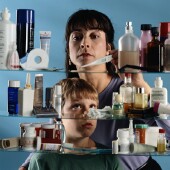
TUESDAY, June 23, 2015 (HealthDay News) — Fifty everyday chemicals considered safe on their own can trigger cancer through combined exposure, says an international team of scientists.
The 174 scientists from 28 countries examined 85 chemicals believed to have no link with cancer. The investigators concluded that at current exposure levels, mixtures of 50 of those chemicals can lead to cancer.
“This research backs up the idea that chemicals not considered harmful by themselves are combining and accumulating in our bodies to trigger cancer and might lie behind the global cancer epidemic we are witnessing,” said study co-author Hemad Yasaei, a cancer biologist at Brunel University in London, England.
“We urgently need to focus more resources to research the effect of low-dose exposure to mixtures of chemicals in the food we eat, air we breathe and water we drink,” he added in a university news release.
The study was published June 23 in the journal Carcinogenesis.
Current research suggests that chemicals could be responsible for as many as one in five cancers, the researchers noted.
“We are definitely concerned that we are now starting to see evidence of a wide range of low-dose effects that are directly related to carcinogenesis, exerted by chemicals that are unavoidable in the environment,” study lead author William Goodson III, a senior scientist at the California Pacific Medical Center in San Francisco, said in the news release.
The scientists called for greater focus on and support for research into the health effects of low-dose exposures to mixtures of chemicals in the environment.
One expert said not nearly enough work has been done in that regard.
“Despite a rising incidence of many cancers, far too little research has been invested into examining the pivotal role of environmental causative agents,” Professor Francis Martin, of Lancaster University in England, said in the news release. “This worldwide team of researchers refocuses our attention on this under-researched area.”
More information
The U.S. National Cancer Institute has more about cancer causes and prevention.
Copyright © 2025 HealthDay. All rights reserved.

